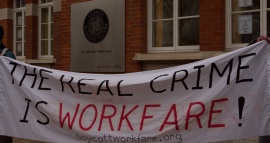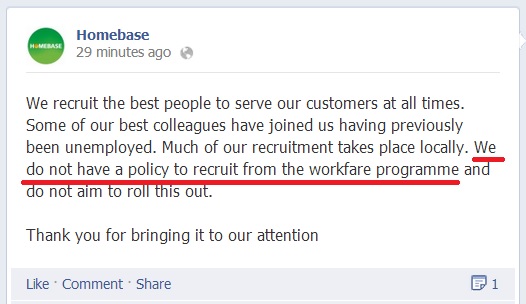
Internet con-man Grant Shapps has been crawling all over the papers today as the Government used Easter Sunday to launch an all out attack on sick and disabled people.
Tory party chairman Shapps claims in the Telegraph today that he will do his job from the pub from now on and his bizarre diatribe suggests that he’s already well on the way to being pissed. The notorious get rich quick scammer rants that sickness benefits are ‘evil’ whilst brandishing figures attempting to smear all those out of work due to illness or disability as scroungers.
Once again the Tories are suggesting that most claims for Employment Support Allowance are not genuine based simply on the fact that many people give up a claim for ESA before they are assessed. This is the exact same trick that the DWP tried to pull last year which simply reveals that for many people sickness is temporary and when they get better they end their claims.
Digging into the numbers however reveals some tragic statistics. Shapps’ pub bore rhetoric is based on figures which breakdown claims for ESA by condition, and provide details of the results of their assessments.
They make for depressing reading. Almost 5000 people with cancer were found ‘fit for work’ between 2008 and 2011, including ten people with malignant brain tumours. Over 1000 people diagnosed with schizophrenia were also deemed scroungers and had benefits stopped.
Two and a half thousand people with MS were found fit for workfare if not paid work and placed in the Work Related Activity Group. A further 800 MS sufferers were thrown off sickness benefits altogether.
Confirming that many claims are temporary in nature, the figures include many people who had broken a limb or suffered some other short term injury or condition. Unsurprisingly many of this group came off benefits before being assessed which can take place several months after making an initial claim.
There are many other reasons a claim might stop before an assessment takes place. Claimants could marry someone and no longer be eligible, or in many cases reach retirement age.
In a predictable spittle-flecked outburst, the right wing press have crowed that almost 10,000 people whose primary conditions was associated with drug use ended their claim before assessment, A similar number were found fit for work – as if employers are suddenly rushing to hire currently using heroin addicts.
Whilst some of this group may have stopped using drugs and therefore ended their claim, some may have found themselves in prison. Others may have slipped out of the benefits system completely due to the chaotic nature of their condition. Some will probably have died from an overdose before the assessment took place.
And it is this that reveals the truly nasty face of this Government. Around 14,000 people with cancer ended their claim before they were assessed. It should be hoped that this is because many of them went into long term remission. The sad truth is that some of them will have died whilst awaiting a benefit decision.
It is these tragic deaths that the vile Tory party are only too happy to exploit in an attempt to prove that half of people on sickness benefits were faking their conditions. They truly are beneath contempt.
The figures are available via google viewer for those without Excel or can be downloaded direct as an xls format.
Follow me on twitter @johnnyvoid
The Void










